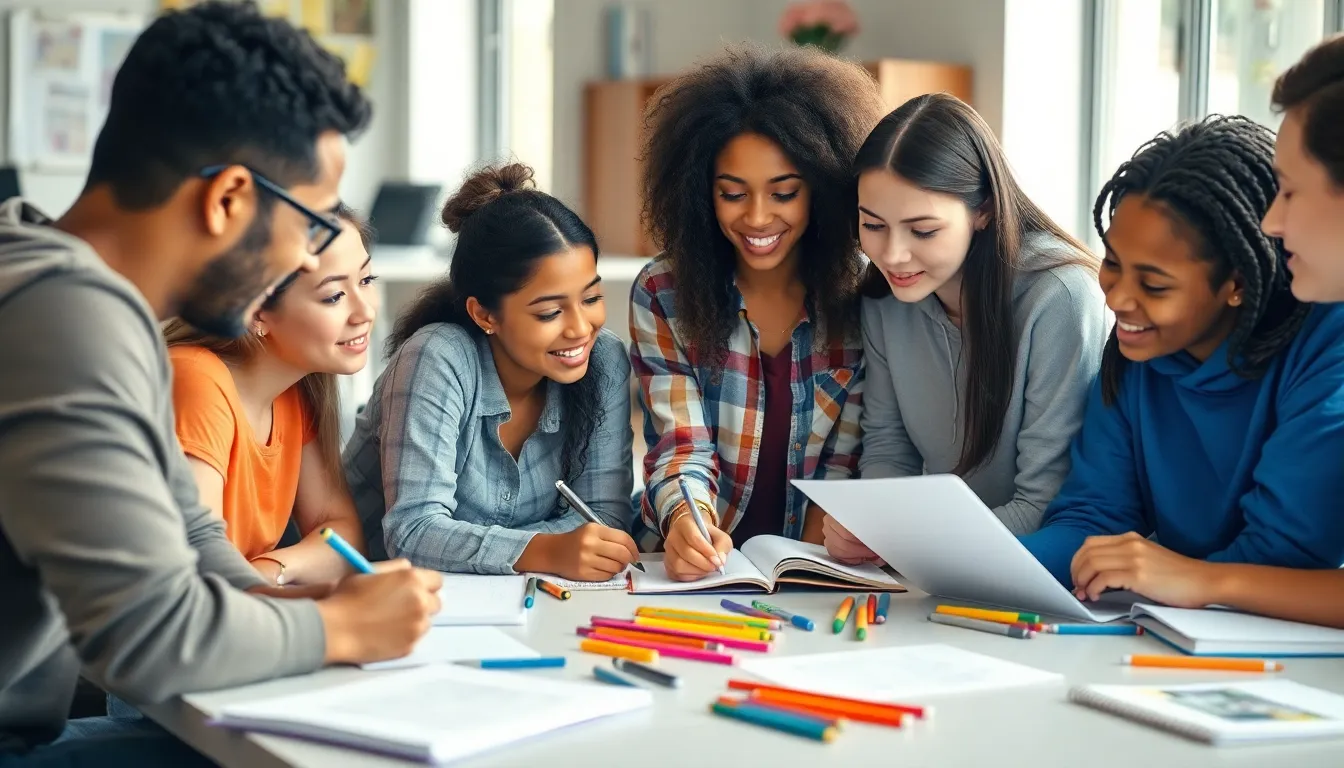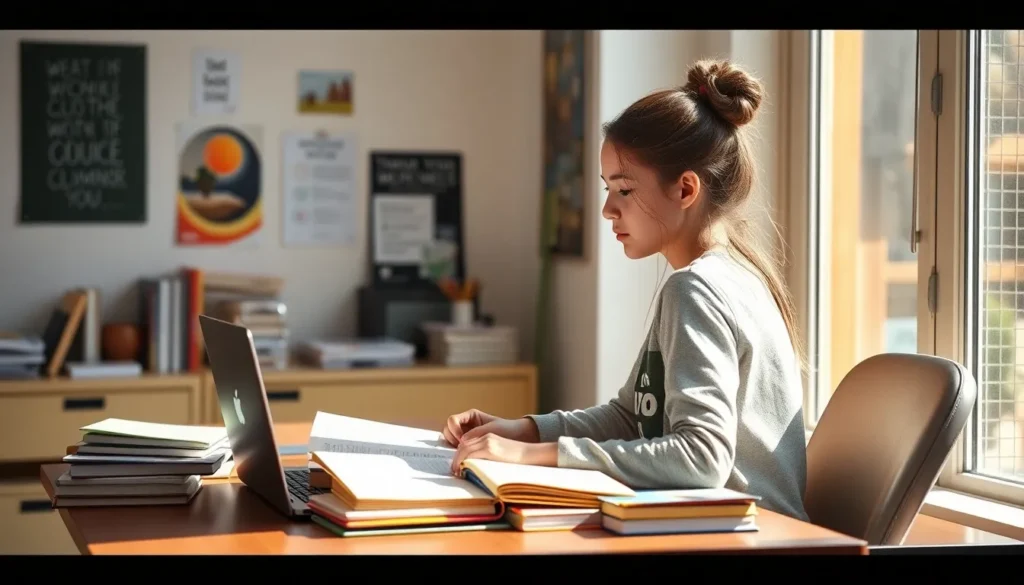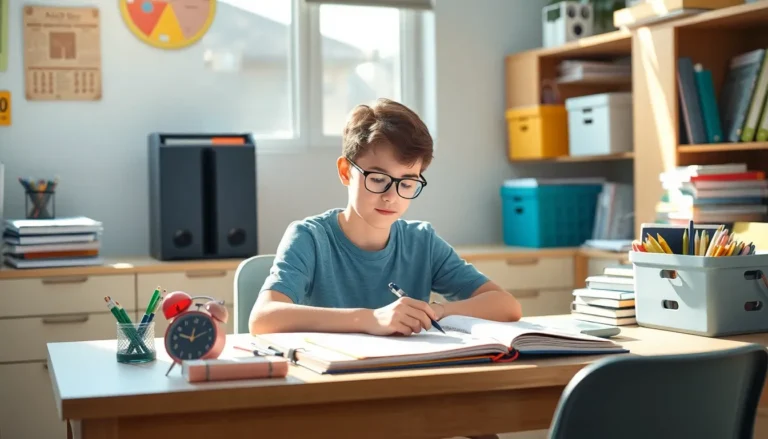Table of Contents
ToggleNavigating the world of academics can be a daunting task for teenagers. With the pressures of schoolwork, extracurricular activities, and social lives, finding effective study strategies is crucial for success. The right approach can make all the difference, transforming study sessions from overwhelming to productive.
This article dives into practical study tips tailored specifically for teens. From creating a distraction-free environment to mastering time management, these strategies empower young learners to take control of their education. By implementing these techniques, teenagers can boost their confidence, improve their grades, and develop lifelong skills that extend beyond the classroom.
Effective Study Tips For Teenagers
Implementing effective study strategies significantly boosts academic performance. Here are some valuable techniques for teenagers to enhance their study habits.
Create a Study Schedule
Creating a study schedule helps manage time effectively. Teens should allocate specific time blocks for each subject or assignment.
- Prioritize tasks based on deadlines and difficulty.
- Set realistic goals for each study session.
- Include short breaks to maintain focus.
- Review the schedule weekly to adjust as needed.
Find Your Optimal Study Environment
Finding an optimal study environment increases concentration and retention. A suitable location minimizes distractions and promotes efficient studying.
- Choose a quiet space with comfortable seating.
- Ensure good lighting to prevent eye strain.
- Keep necessary materials nearby to avoid interruptions.
- Personalize the space to make it inviting and motivating.
Techniques To Enhance Learning

Effective learning techniques help teenagers retain information and master subjects. Here are some methods to enhance study sessions.
Active Learning Methods
Active learning engages students in the material, promoting deeper understanding. Techniques include:
- Discussion: Participate in discussions with peers, teachers, or family to clarify concepts and gain new perspectives.
- Teaching: Explain subjects to others. Teaching reinforces understanding and highlights knowledge gaps.
- Practical Application: Use real-world examples to apply theories, making information more relatable and easier to remember.
- Role-Playing: Simulate scenarios that reflect the material, providing context and enhancing retention.
Note-Taking Strategies
Effective note-taking improves information retention and organization. Effective strategies include:
- Cornell Method: Divide pages into sections for cues, notes, and summaries, helping to organize thoughts and facilitate review.
- Mind Mapping: Visualize connections between ideas using diagrams. This technique promotes understanding of complex topics.
- Color Coding: Use different colors for categories or topics. Color coding enhances visual learning and memory recall.
- Bullet Points: Write key concepts in bullet points. This format simplifies review and highlights essential information.
Incorporating these techniques supports effective study habits and increases academic success for teenagers.
Staying Motivated While Studying
Staying motivated during study sessions is crucial for teenagers. Achieving consistent focus and enthusiasm can lead to better retention and understanding of material.
Setting Achievable Goals
Setting achievable goals helps teenagers maintain motivation. Goals should be specific, measurable, and time-bound, allowing them to track progress. For example, a student might aim to complete five math problems within 30 minutes or read one chapter of a textbook before taking a break. Aligning goals with personal strengths and interests enhances motivation. Revisiting and adjusting these goals regularly ensures they remain relevant and attainable.
Rewarding Yourself
Rewarding oneself after completing study goals reinforces positive behavior. Rewards can vary from enjoying a favorite snack to engaging in leisure activities, such as watching a show or playing a video game. Establishing a reward system encourages teenagers to stay focused and motivated throughout their study sessions. For instance, after finishing a productive study block, a student could take a 15-minute break for a quick walk or listen to music. This concept of positive reinforcement significantly boosts motivation and creates a balanced study routine.
Balancing Study Time With Leisure
Balancing study time with leisure ensures teens remain productive while enjoying their personal time. Effective management of time and breaks enhances academic performance and overall well-being.
Time Management Skills
Time management skills play a crucial role in balancing studies and leisure. Teens should prioritize tasks by urgency and importance. They can use planners or digital tools to track assignments and deadlines. Allocating specific times for study sessions leads to better focus and reduces procrastination. Establishing a consistent daily routine supports discipline and habit formation, encouraging students to dedicate attention to academics without sacrificing personal interests.
Incorporating Breaks
Incorporating breaks into study sessions improves concentration and retention. Short breaks, typically 5-10 minutes after every 25-30 minutes of focused studying, can refresh the mind. Engaging in light activities, such as stretching or walking, during breaks stimulates circulation and fosters creativity. Scheduling longer breaks for hobbies or quick social interactions helps recharge mental energy and provides motivation to return to studying more effectively and efficiently.
Adopting effective study strategies can transform a teenager’s academic experience. By creating structured study environments and mastering time management, they can boost their confidence and performance. Incorporating active learning techniques and effective note-taking methods further enhances their understanding and retention of material.
Staying motivated is essential for maintaining focus and productivity. Setting achievable goals and rewarding progress helps reinforce positive study habits. Balancing study time with leisure activities promotes overall well-being, ensuring that academic success doesn’t come at the expense of personal enjoyment. With these strategies in place, teenagers can navigate their academic challenges with greater ease and confidence.





